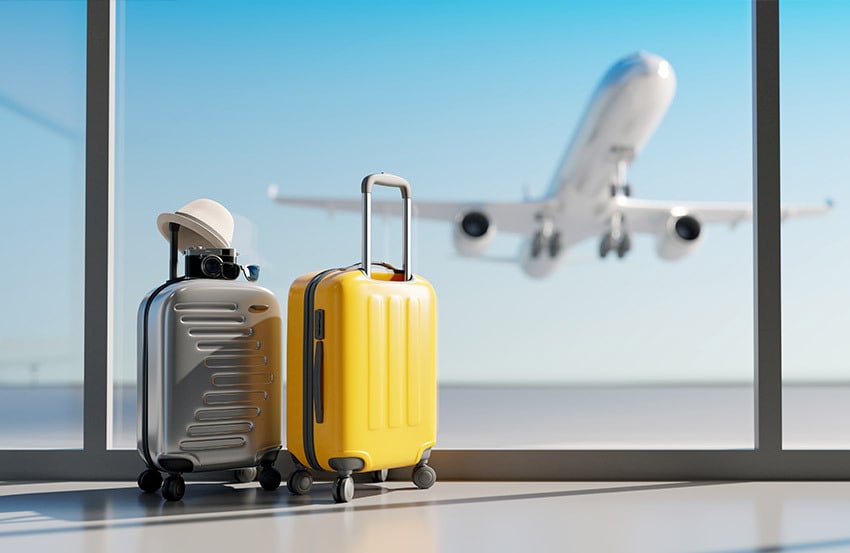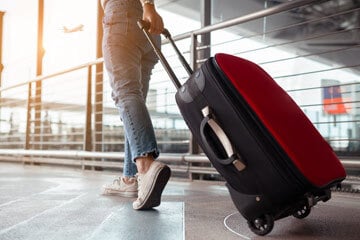If you’re planning on travelling to Europe this year, it’s important to find out any new travel rules or local laws in place.
From changes to the airport liquid rule to smoking and drinking bans in Spain, here’s a list of new rules for Brits’ favourite tourist destinations.

What new travel rules can we expect for 2024?
Whether you’re travelling to the EU or further afield, there are a few rules to familiarise yourself with before you even pack.
Changes to liquids rule?
The 100ml liquid rule introduced in 2006 could finally be relaxed for several UK airports, with others expected to follow suit in the next 12 months.
This rule states that all liquids taken through security must fit into a container of no more than 100ml. These must fit comfortably into a transparent plastic bag measuring roughly 20cm x 20cm.
But a rollout of new 3D luggage scanners in UK airports means that you'll soon be able to take containers of up to 2 litres in your hand luggage. Plus they'll no longer have to be kept together in a plastic bag, or removed from your main bags.
But the limit is being temporarily reintroduced from 9 June at certain airports.
The scanners will also be launched in Bristol Airport (BRS) from 14 June, although there will be a 330ml liquid rule in place. There are also new scanners in Birmingham (BHX) airport, although the 100ml rule has been kept in place. Other UK airports, including London Gatwick, Heathrow and Manchester still have the restrictions on liquids in place.
Two new schemes for Brits travelling to most EU countries
Two separate but connected schemes are coming into force soon, which will affect all non-EU citizens heading to most EU countries. This includes UK citizens travelling to Europe:
- EU Entry/Exit System (EES). This is an automated system which registers visitors from non-EU countries when they cross an EU external border. This is currently scheduled for launch in late 2024.
- European Travel Information and Authorisation System (ETIAS). Like an ESTA for the States, this is a digital travel authorisation to enter the EU. For all countries which don’t require a visa to visit the EU, citizens will need to apply for an ETIAS from mid-2025.
Our guide helps explain 'what is the ETIAS' and how it'll impact travellers from the UK.
New local laws to be aware of
Before travelling to any new country or territory, it’s important to familiarise yourself with any local laws different from what you’re used to. This way, you can avoid landing yourself in hot water, and potentially being stung for a whack of money.
Always check foreign travel advice at GOV.UK before you travel.
Quick links for popular travel destinations from the UK: Spain | Portugal | France | Italy | Germany | Croatia | Greece | Turkey
Also bear in mind that many popular destinations may have their own local laws. In particular, there are a lot of new travel rules in Spain, particularly in its tourist hotspots. These are some of the new local rules you should avoid falling foul of.
Spain: Alcohol clampdown in Balearic Islands
In an attempt to stem antisocial behaviour in certain tourist hotspots, there’s a ban on the sale of alcohol between 9.30pm and 8am. The locations are:
- Sant Antoni in Ibiza
- Llucmajor, Palma and Calvia in Majorca
In addition, party boats are prohibited from coming within one mile of each of these locations. This means that nobody in these spots can be picked up or dropped off by party boat either.
Spain: Licensed taxi rule
Beware unlicensed taxis if you’re travelling to Spain this summer. You should use a registered taxi for your airport transfer or other travel, or you risk a fine of up to €600 (just over £500).1
Spain: Drinking or smoking on the beach
If you plan on opening a beer or lighting a cigarette on the beach in Spain, be sure to check the local laws in advance. If you drink alcohol on the beach in Benidorm on the Costa Blanca, for example, you could be fined up to €750 (£641). This goes up to €2,000 (£1711) for smoking on the beach. 2
Spain: Nightswimming rule in Benidorm
In order to prevent any swimming-related accidents, there are fines for those who swim between midnight and 7am off Benidorm. These can be between €750 (£641) and €1,200 (£1,026)2.You risk the same fine for sleeping or camping on the beach. Even if you have camping travel insurance, this policy may become void if you're found to be breaking the rules.
Wherever you go, be aware of tourist tax
Numerous cities and destinations have tourist taxes. These can usually be paid to your hotel, but are separate from the accommodation charge. This is generally paid for in local currency by cash or card. You can see an estimate of how much you might pay by using our tourist tax checker.
France: Paris Olympics tax
The most notable tourist tax hike this year is in Paris, where the Olympics has led to a threefold increase to support the local metro and bus system. The tax is payable per person per night, and varies based on the accommodation’s star rating:
- 2-star hotel: €3.25 (£2.77) per person per night
- 3-star hotel: €5.20 (£4.43) per person per night
- 4-star hotel: €8.13 (£6.92) per person per night
- 5-star hotel: €10.73 (£9.13) per person per night3
Greece: New overnight visitor levy
In addition to the existing accommodation tax, a new climate levy has been introduced in Greece this year for overnight visitors. This varies based on the type of accommodation, and ranges from:
- €1.50 (£1.30) to €10 (£8.60) per night in high season (March - October)
- €1 (£0.86) to €4 (£3.45) per night in low season (November - February)4
Italy: Venice tourist tax
Venice is trialling a new tax for day visitors over 20 days in 2024, with a full rollout expected in 2025. Tourists visiting the floating city will pay €5 (approximately £4.30) to enter Venice between 8.30am and 4pm.5
The days in 2024 are as follows:
- May: 11, 12, 18, 19, 19, 25, 26
- June: 8, 9, 15, 16, 16, 22, 23, 29, 30
- July: 6, 7, 13, 14
Will new travel rules affect my travel insurance?
Whenever you head overseas, it's a good idea to compare travel insurance quotes before you travel. It's also handy to pack your travel insurance documents or have them saved on your phone. This can protect you against many things going wrong, including baggage cover for lost or stolen luggage, cancellations and medical care.
But it’s important to know what it doesn’t cover too. Generally speaking, policies will exclude any losses incurred if you’re breaking local laws, for example. You’re also likely not to be covered if you’re travelling against government advice.
You will also not be covered if you miss flights, travel connections or booked accommodation if you’re denied entry to a country or territory.
If you’re travelling to the continent this summer, check out European travel insurance. But familiarise yourself with the policy first, so you know exactly what you’re covered for.
Also, to cover all bases, find out how to get emergency travel documents if your passport is lost or stolen abroad.
Compare travel insurance








